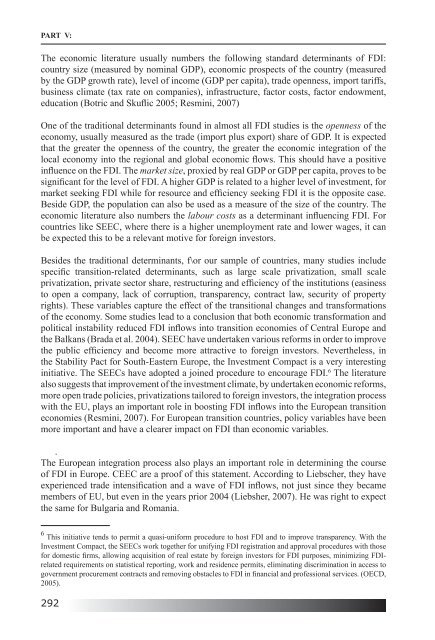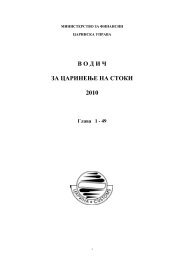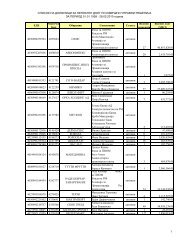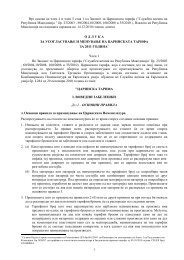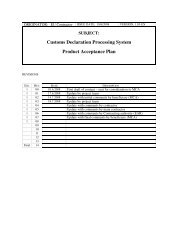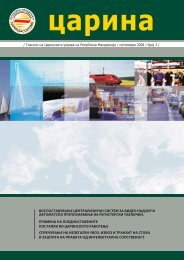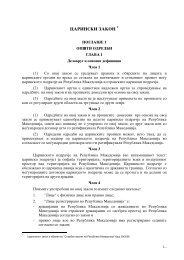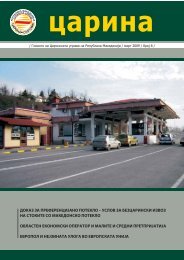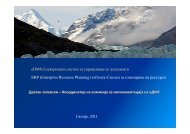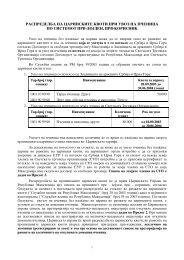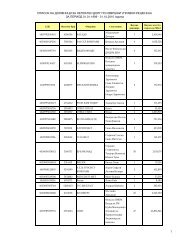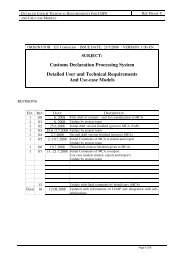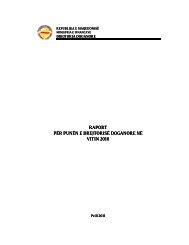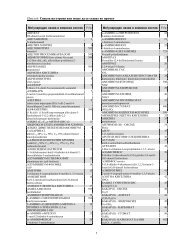REGIONAL COOPERATION AND ECONOMIC INTEGRATION
REGIONAL COOPERATION AND ECONOMIC INTEGRATION
REGIONAL COOPERATION AND ECONOMIC INTEGRATION
- No tags were found...
You also want an ePaper? Increase the reach of your titles
YUMPU automatically turns print PDFs into web optimized ePapers that Google loves.
PART V:<br />
The economic literature usually numbers the following standard determinants of FDI:<br />
country size (measured by nominal GDP), economic prospects of the country (measured<br />
by the GDP growth rate), level of income (GDP per capita), trade openness, import tariffs,<br />
business climate (tax rate on companies), infrastructure, factor costs, factor endowment,<br />
education (Botric and Skuflic 2005; Resmini, 2007)<br />
One of the traditional determinants found in almost all FDI studies is the openness of the<br />
economy, usually measured as the trade (import plus export) share of GDP. It is expected<br />
that the greater the openness of the country, the greater the economic integration of the<br />
local economy into the regional and global economic flows. This should have a positive<br />
influence on the FDI. The market size, proxied by real GDP or GDP per capita, proves to be<br />
significant for the level of FDI. A higher GDP is related to a higher level of investment, for<br />
market seeking FDI while for resource and efficiency seeking FDI it is the opposite case.<br />
Beside GDP, the population can also be used as a measure of the size of the country. The<br />
economic literature also numbers the labour costs as a determinant influencing FDI. For<br />
countries like SEEC, where there is a higher unemployment rate and lower wages, it can<br />
be expected this to be a relevant motive for foreign investors.<br />
Besides the traditional determinants, f\or our sample of countries, many studies include<br />
specific transition-related determinants, such as large scale privatization, small scale<br />
privatization, private sector share, restructuring and efficiency of the institutions (easiness<br />
to open a company, lack of corruption, transparency, contract law, security of property<br />
rights). These variables capture the effect of the transitional changes and transformations<br />
of the economy. Some studies lead to a conclusion that both economic transformation and<br />
political instability reduced FDI inflows into transition economies of Central Europe and<br />
the Balkans (Brada et al. 2004). SEEC have undertaken various reforms in order to improve<br />
the public efficiency and become more attractive to foreign investors. Nevertheless, in<br />
the Stability Pact for South-Eastern Europe, the Investment Compact is a very interesting<br />
initiative. The SEECs have adopted a joined procedure to encourage FDI. 6 The literature<br />
also suggests that improvement of the investment climate, by undertaken economic reforms,<br />
more open trade policies, privatizations tailored to foreign investors, the integration process<br />
with the EU, plays an important role in boosting FDI inflows into the European transition<br />
economies (Resmini, 2007). For European transition countries, policy variables have been<br />
more important and have a clearer impact on FDI than economic variables.<br />
.<br />
The European integration process also plays an important role in determining the course<br />
of FDI in Europe. CEEC are a proof of this statement. According to Liebscher, they have<br />
experienced trade intensification and a wave of FDI inflows, not just since they became<br />
members of EU, but even in the years prior 2004 (Liebsher, 2007). He was right to expect<br />
the same for Bulgaria and Romania.<br />
6 This initiative tends to permit a quasi-uniform procedure to host FDI and to improve transparency. With the<br />
Investment Compact, the SEECs work together for unifying FDI registration and approval procedures with those<br />
for domestic firms, allowing acquisition of real estate by foreign investors for FDI purposes, minimizing FDIrelated<br />
requirements on statistical reporting, work and residence permits, eliminating discrimination in access to<br />
government procurement contracts and removing obstacles to FDI in financial and professional services. (OECD,<br />
2005).<br />
292


